Tehran, Mar 21 (AP) Iran's leaders vowed to overcome the coronavirus outbreak in upbeat messages marking the Persian New Year on Friday, even as the Health Ministry announced 149 more fatalities, bringing the country's death toll to 1,433.
Iran is battling the worst outbreak in the Middle East, with nearly 20,000 confirmed cases, and has been widely criticized for its slow response.
Supreme Leader Ayatollah Ali Khamenei, who has final say on all state matters, called the new year “the year of leaps in production” in Iran's economy, which has been under strain since U.S. President Donald Trump withdrew from the 2015 nuclear accord and imposed .harsh new sanctions.
President Hassan Rouhani also marked the new year, known as Nowruz, by promising a better economy. “We will put the coronavirus behind us soon with unity, with hard work and with cooperation,” he said.
Most people who come down with the COVID-19 illness caused by the virus experience only minor symptoms and recover within weeks.
But the virus is highly contagious and can be spread by people showing no symptoms. It can cause severe illness, including pneumonia, particularly in sick or elderly patients.
More than 240,00 people have been infected worldwide. More than 10,000 have died, while more than 85,000 have recovered.
Rouhani has defended his government's response to the pandemic in the face of widespread criticism that officials acted too slowly and may have even covered up initial cases before infections spread rapidly across the country.
He also sought to highlight what he viewed as the achievements of the past year, including the downing of a sophisticated U.S. drone and missile strikes on U.S. bases in Iraq in retaliation for the killing of Iran's top general in Baghdad.
Rouhani assured Iranians his administration will prioritize health in the coming year and said it had stockpiled basic supplies.
Nowruz is a major holiday in Iran, when shoppers typically pack local markets and take extended vacations. Most shops are closed this year, and those merchants who are still working can be seen warily accepting cash or debit cards from customers in face masks.
Khamenei issued a religious edict this week prohibiting all unnecessary travel and authorities have restricted travel between cities. After weeks of heavy criticism, authorities finally closed two major religious shrines in recent days.
Other countries in the region have imposed far stricter measures to contain the virus, including canceling flights, sealing borders and forcing nonessential businesses to close.
In Tel Aviv, the sprawling Mediterranean beachfront is deserted and authorities have roped off outdoor gyms and playgrounds to keep people from using them. Israel has reported more than 700 confirmed cases.
Authorities reported Israel's first death late Friday, saying an 88-year-old man with underlying health problems had passed away after a week in the hospital.
Jordan announced a total curfew starting Saturday, saying all shops would be closed. Government spokesman Amjad Adaileh said a “mechanism” would be announced Tuesday to allow people to shop for essentials at specific times.
Anyone violating the curfew could face up to a year in jail. Jordan has reported 85 cases.
In Iraq, which has one of the highest death rates in the region, authorities struggled to keep Shiite pilgrims from marking the annual commemoration of the death of Imam Mousa al-Kazim despite a week-long curfew in the capital.
Thousands of Iraqis typically walk to the shrine of the imam in the Khazimiyah area of Baghdad.
Security forces have been stopping pilgrims, but more keep arriving. Late Thursday, the doors of the shrine were closed and the electricity turned off.
Officials urged the faithful to perform the pilgrimage “remotely” to keep themselves and others safe.
Caretaker Prime Minister Adel Abdul-Mahdi urged citizens to abide by a government curfew, and Grand Ayatollah Ali al-Sistani, a deeply revered Shiite cleric, cautioned them not to “underestimate” the severity of the pandemic.
Iraq has been grappling with anti-government protests for months, following years of conflict that have damaged its health care system.
The coronavirus outbreak, which has infected over 200 people and killed 17, and the fallout from cratered oil prices, threaten to plunge the country into a major crisis.
The U.S.-led coalition in Baghdad says it will "temporarily return some" of its forces from Iraq to their home countries in coming days and weeks in response to the Iraqi government's decision to suspend all training.
It provided no numbers. The coalition also said that some coalition troops are being moved off a few smaller bases, partly to protect them from the coronavirus and partly because of progress in the campaign against the Islamic State group.
Saudi Arabia announced it would shut down domestic air travel, buses, taxis and trains for the next two weeks, beginning Saturday. The monarchy has reported 274 confirmed cases, eight of whom recovered.
In a televised address late Thursday, King Salman said: “We are living through a difficult phase of the world's history.”
“However, we are completely certain that this phase will end and pass, despite its harshness and bitterness and its difficulties,” he said, assuring Saudis the country had sufficient medical care and supplies to get through the crisis. (AP)
(The above story is verified and authored by Press Trust of India (PTI) staff. PTI, India’s premier news agency, employs more than 400 journalists and 500 stringers to cover almost every district and small town in India.. The views appearing in the above post do not reflect the opinions of LatestLY)



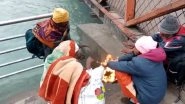


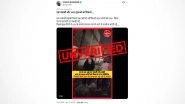
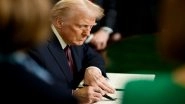

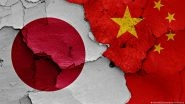
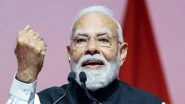


 Quickly
Quickly


